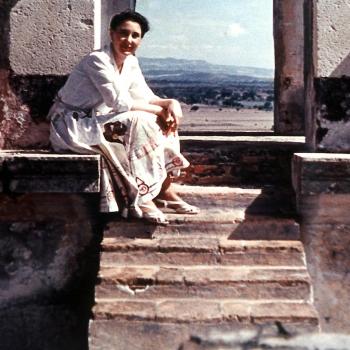“I can’t wait for this to be over.”
In the month since the UK entered lockdown, I have heard this refrain echoed countless times by friends, colleagues, and strangers. It’s entered my own mind at times. But, while it’s a temptingly easy thing to say, it’s also deeply tragic.
Of course, on one level, this phrase is merely expressing a desire for an end to human pain and death. And that’s natural, reasonable. We long for an end to suffering, and have a duty to work and pray for an end to illness. After all, we are made for a place where “God will wipe every tear from [our] eyes, and there shall be no more death or mourning, wailing or pain.”1
However, more commonly, this phrase is uttered from an individualistic perspective. It gives voice to the fear of sacrifice, resistance to uncertainty, and frustration with the mundane. Ultimately, it often reflects a lack of hope and interest in the reality in front of us and a desire to exchange it for one that we can control.
This is deeply wrong. Yes, we are asked to make extraordinary sacrifices these days. But we need not wait for this to be over, because our life is now. The circumstances in front of us – home working, social distancing, the suspension of public Masses, even the suffering and fear – are the only ones that exist. Reality is not a waste of time; dreaming of a future reality that does not exist, on the other hand, is.
I’ve got good company in this conviction. In a recent message to the students of my college at Cambridge, Rowan Williams told us: “One thing you can be sure of is that this time will not be ‘wasted’. There will be more in your minds and feelings at the end of it than at the beginning.” Even more forcefully, a few months ago, Fr. Julian Carron wrote, “What an opportunity this circumstance we are living could become! An opportunity you do not want to miss.”
How is this attitude possible? What do these circumstances offer us, that we do not want to miss? Ultimately, this time holds a unique promise for each person. But if you find yourself saying (or thinking) “I can’t wait for this to be over,” allow me to suggest a few things for you to explore:2
- Solitude
Embrace solitude. This is a fundamental state of being with oneself and is not the same thing as loneliness; if we remain aware of our connectedness, time in solitude need not be lonely. But time in solitude does cultivate silence of the heart through interior and exterior stillness. And so, in solitude, we can learn to pray. We can be present to the small events of every day. We can be grateful for gifts that would otherwise go unnoticed.
Solitude is uncomfortable and we are instinctively tempted to flee it. This has never been easier than in the age of modern technology. We can fill our original silence with endless Zoom calls and constant news updates and Netflix binges. But if we resist this temptation, we have the chance to discover the promise of the present moment.
- Home
Let us embrace our homes. We are a hyper-mobile generation, traveling extensively both for work and for leisure. But mobility neither equals nor guarantees freedom. Let us reflect on our history, and identify times when we experienced true freedom. Then we can consider: is that state of the soul possible within the confines of our home?
Two things can help us discover freedom in our homes. The first is a rule of life, a daily rhythm of work, rest, and prayer that structures our day. The second is the witness of others. We can read books and watch movies about people who were free in the midst of what appeared to be extremely limiting circumstances. Monks are a good option here; the Carthusians are my absolute favourite. The writing of Cardinal Van Thuan, who was unjustly imprisoned for years in solitary confinement, has also helped me greatly during lockdown.
- Solidarity
How many events in our lives have we shared with so many human beings throughout your community and indeed across the world? Have we ever had such an expansive window into the experience, the suffering, the resilience of others?
Let us reflect on it. Then act on it. We can donate money to health services and charities, which are struggling mightily at this time. We can ask our elderly neighbours if we can do their shopping. We can call and check in on our friends who suffer from mental illness. We can to our politicians (in the UK or USA) in support of policies that promote peace, health, and human flourishing. These acts of solidarity should flow spontaneously from our recognition of our fundamental interconnectedness and interdependence.
- Community
For those of us living with members of our family, this is an incredible opportunity to embrace our belonging to them. Even those of us living with friends or housemates are invited to share our life with fullness and authenticity. In such close quarters, we are utterly unable to avoid our faults and failings. This is a chance to learn forgiveness, to practice vulnerability, and grow in patience. Above all, it’s a chance to strengthen our heart’s capacity to love.
This time should also bring clarity to our life of friendship. In this time of separation from our ordinary daily companions, whom do we miss? Whom do we see living and loving well during this time, and who helps us to do the same? This is an opportunity to grow in awareness of the faces that accompany us to our destiny.
- Ultimate meaning
Finally, and perhaps most importantly, this time of pandemic invites us to verify our answers to questions about the meaning of life. When we cannot control our circumstances, our hearts burn to know what makes our daily reality worth living. When we no longer have our health, our jobs, our activities, or our friends, what good remains? In the face of death and pain, what makes our human existence meaningful?
Spoiler: it’s not productivity. This perennial temptation is particularly forceful these days, when many are using the lockdown to get ahead on projects or pick up new skills. Nothing is inherently wrong with these endeavors. But measuring our time by its material output, no matter the form, cheats us. Why? Because it reinforces our obsession with control and closes our eyes to the horizon of the infinite.
Instead, let us take this time to examine and embrace the true meaning of our lives. If we dig deeply into our experience we will discover something beautiful and mysterious. Fr. Carron is right: this circumstance is an opportunity we do not want to miss.











